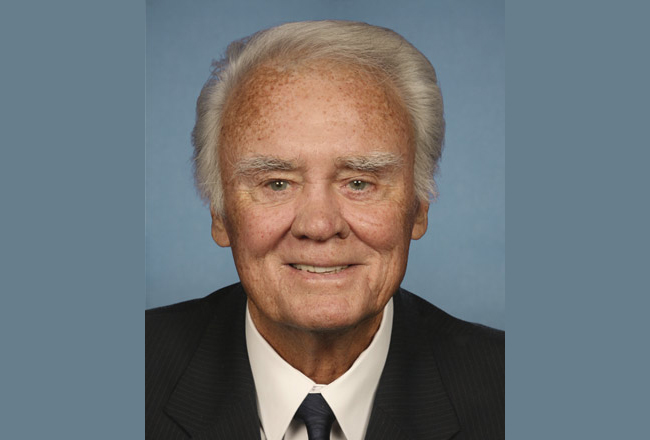
U.S. Rep. C.W. Bill Young’s planned retirement has Democrats giddy and Republicans nervous in what is likely to become one of the most-watched congressional races next year.
Young, 82, announced on Wednesday that he will not seek re-election to U.S. House District 13, the seat the Republican has held for more than 40 years but which has taken on a bluer tinge over the past few years.
Republicans still hold a slight registration edge over Democrats, but independents make up nearly a quarter of the voters in the Pinellas County district, considered the only true toss-up, open seat thus far in next year’s congressional races.
“It will be harder in that district than probably any other district in Florida to elect a Republican where there has been a long-time Republican in place. It will be a difficult run for whoever tries,” said Tom Slade, a former chairman of the Republican Party of Florida who helped Young early in his political career.
Young’s decision set off a bipartisan scramble in Tampa Bay, but a win for Democrats could be even more significant as they pin their hopes on winning the 17 seats needed to recapture a U.S. House majority in 2014.
The day Young announced his plans to retire, Democratic Congressional Campaign Committee Chairman Steve Israel gloated in a statement that Young’s departure “should serve as a wake-up call to Speaker Boehner and House Republicans: if they continue to cave to the Tea Party’s radical demands and threaten the country’s financial stability, they will see even their own members jump off their sinking ship.”
And Democratic candidate Jessica Ehrlich, a lawyer who failed to unseat Young last year, sent a gleeful e-mail to supporters on Friday entitled “Game Changer,” declaring the race “the only open seat toss up in the entire country!” based on the Cook Report, the Rothenburg Report and Roll Call.
“These are the kinds of seats you have to win to be the majority in Congress,” said Florida Democratic strategist Steve Schale, who helped boost President Obama to victory in Florida and is advising former Gov. Charlie Crist, who is expected to announce his intention to run against Gov. Rick Scott next month. “The party that wins a district like that is a good barometer for where the rest of the country is today.”
Young, elected to Congress in 1970, was the kind of Republican who represents the majority of GOP voters in the district. Once considered a conservative, by today’s standards Young and his ilk are now considered moderates, a brand that sends shivers to Republicans in less centrist regions.
GOP consultant Rick Wilson recalled working on another Pinellas County campaign 25 years ago.
“Bill Young was the rock red, far-right conservative guy and that seat was as red as you could possibly imagine. The world changed and things got different,” he said.
Even while his party was moving farther to the right, Young, a one-time House appropriations chairman, was considered unbeatable, in part thanks to a successful career bringing home the bacon in his district.
“Everybody there has gone to schools in some Bill Young something or other,” Schale said.
The more centrist make-up of the district could also give an edge in the general election to Republicans, who have seen moderate candidates thwarted in primaries by tea party activists who then face problems winning in general elections.
To capitalize on that, the GOP would do best with a middle-of-the-road nominee “who is a conservative with a smile on their face and who can be affable and friendly,” Wilson said.
“You can’t go to sleep on this seat. You can’t just run a standardized Republican primary campaign and then that’s that. You’re going to have a slightly different selling proposition,” he said.
Republicans might also fare better in a mid-term election when GOP voters historically outflank Democrats at the polls in Florida.
But, as in the 2012 GOP presidential primary, a brutal GOP run-off could benefit the Democratic nominee next year, said University of South Florida political science professor Susan MacManus.
Another plus for the left: Crist grew up in the district, lives there and still holds a lot of star-power in the region. Having the support of Crist, if he decides to run as expected, would assist the Democratic nominee. And garnering stage or fund-raising time with prominent national figures — like Bill or Hillary Clinton — who are certain to stump in Tampa Bay for Crist won’t hurt, either.
In contrast, Scott, whose popularity remains low, would be unlikely to help the Republican nominee in the district, which voted in favor of Alex Sink, the Democratic contender who lost to Scott during the tea party wave of 2010.
Most agree that both parties need to steer clear of the fringes to win the seat next year.
“The candidate most likely to succeed in the district will be folks that are sensible, across-the-aisle, involved in their community and seen as leaders first, partisan second,” Schale said. “This is the kind of district Alan Grayson and Allen West won once. It’s just not the kind of place that it’s ever going to for any length of time have somebody that’s out of the mainstream of political thought.”
–Dara Kam, News Service of Florida





























Leave a Reply